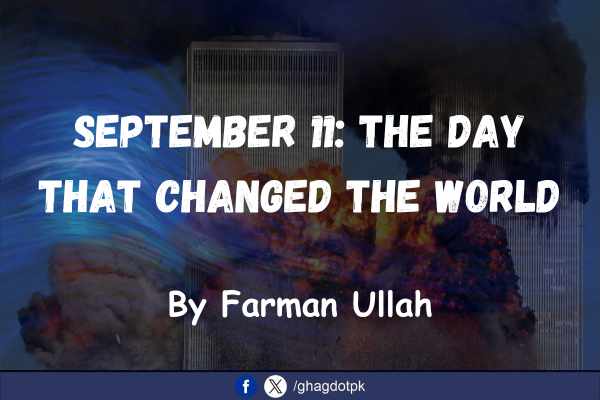By Farman Ullah
What happened on September 11, 2001?
On that fateful Tuesday morning, 19 al-Qaeda terrorists hijacked four American commercial planes heading to the West Coast. In a coordinated attack, they intentionally crashed the planes into iconic targets. Two flights, American Airlines Flight 11 and United Airlines Flight 175, took off from Boston and slammed into the World Trade Center’s North and South Towers in New York City at 8:46 am and 9:03 am, respectively, causing both towers to collapse. Another plane, American Airlines Flight 77, departed from Virginia’s Dulles International Airport and crashed into the Pentagon at 9:37 am. The fourth plane, United Airlines Flight 93, leaving from New York, New Jersey, went down in a field in Shanksville, Pennsylvania, at 10:03 am, after passengers attempted to overpower the hijackers in the cockpit.
A Brazen Assault
The mastermind behind the attacks, Osama bin Laden, orchestrated the chaos from a camp in Afghanistan, using passenger planes as weapons. This brazen assault on US soil was a crushing blow to the world’s greatest power, which had considered itself invincible after the Cold War and the Soviet Union’s collapse.
A Global Response
The US responded with despair and sadness, earning sympathy from the global community, which demanded justice and revenge. However, the ‘War on Terror’ declared by President George W. Bush has become a never-ending conflict, fought on a global scale without clear boundaries or timelines.
Economic loss
The 9/11 attacks had a devastating impact on the economy, with far-reaching consequences that still linger today. The wars in Afghanistan and Iraq have come at a staggering cost of trillions of dollars, while the creation of the Department of Homeland Security has added over $1 trillion to the national bill since 2001. The attacks also led to a significant decline in international trade and tourism, resulting in substantial losses for businesses and industries that rely on these sectors. The areas directly affected, such as Lower Manhattan, suffered greatly, with considerable losses in revenue and business activity. The airline and insurance industries faced significant challenges, and increased security costs became a new reality for businesses and organizations across the board. Most concerning, however, are the long-term effects on economic growth and development, which continue to impact the nation’s prosperity. According to a report by the New York Federal Reserve, the total economic loss attributed to 9/11 is estimated to be over $3.3 trillion – a staggering figure that highlights the enduring impact of that fateful day.
The Human Cost
According to Johannes Thuman, a Berlin-based expert, the War on Terror has claimed approximately 930,000 lives, including 400,000 civilians. The financial toll of this war has been staggering, with the US paying a trillion-dollar price tag.
War on Terror
The launch of military campaigns in Afghanistan and Iraq led to ongoing conflicts and instability in the region.
Global Surveillance
Expanded surveillance programs and intelligence gathering, raising concerns about government overreach and privacy.
Islamophobia and Hate Crimes
Increased discrimination and violence against Muslim communities and individuals.
Political Polarization
Increased political divisions and polarization in the US, influencing domestic and foreign policy.
Shift in Global Politics
Changes in international relations, including strained alliances and increased tensions with certain nations.
Changes in Air Travel
Enhanced security protocols and screening processes, altering the air travel experience.
A Critical Perspective
American expert Bernd Greiner notes that, despite its global implications, the US has suffered immense losses in Iraq and Afghanistan. Historian Stephen Wertheim laments that the US could have channeled its vast resources into constructive projects, rather than reacting destructively to the 9/11 attacks.






